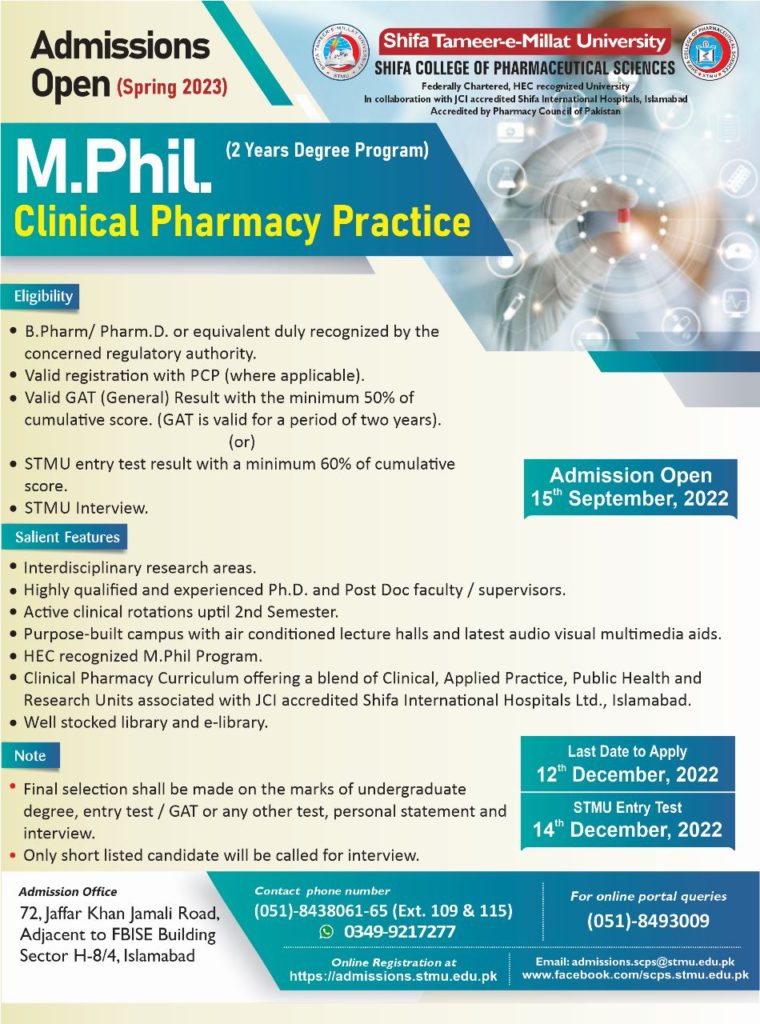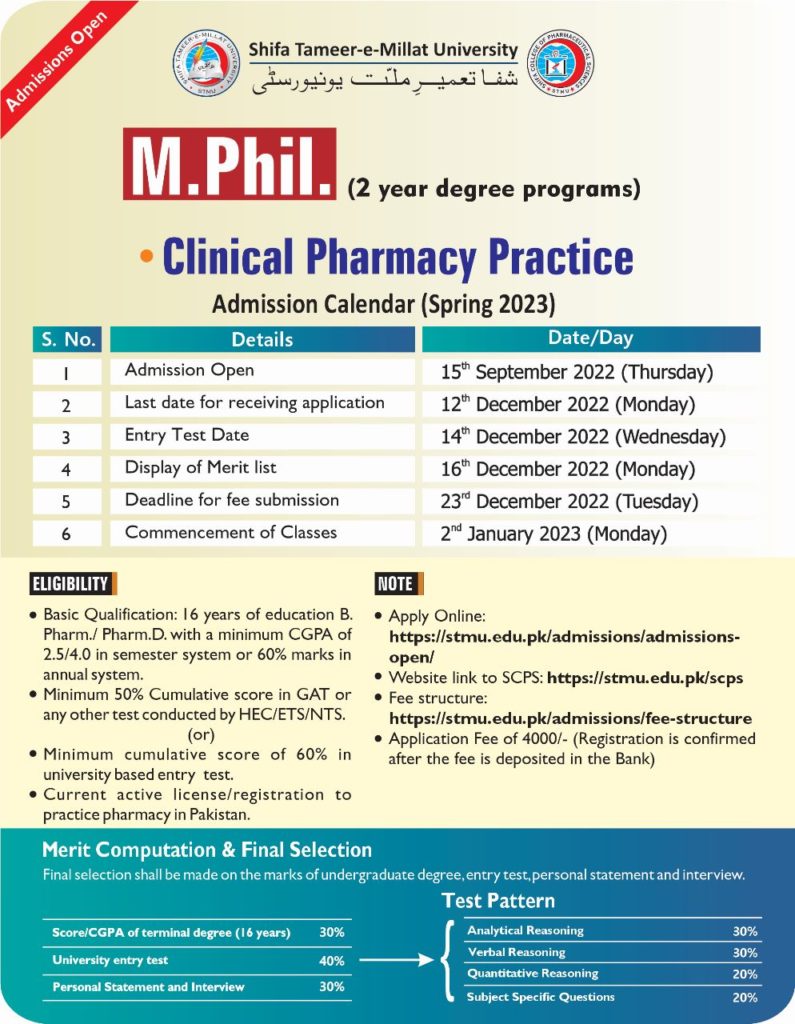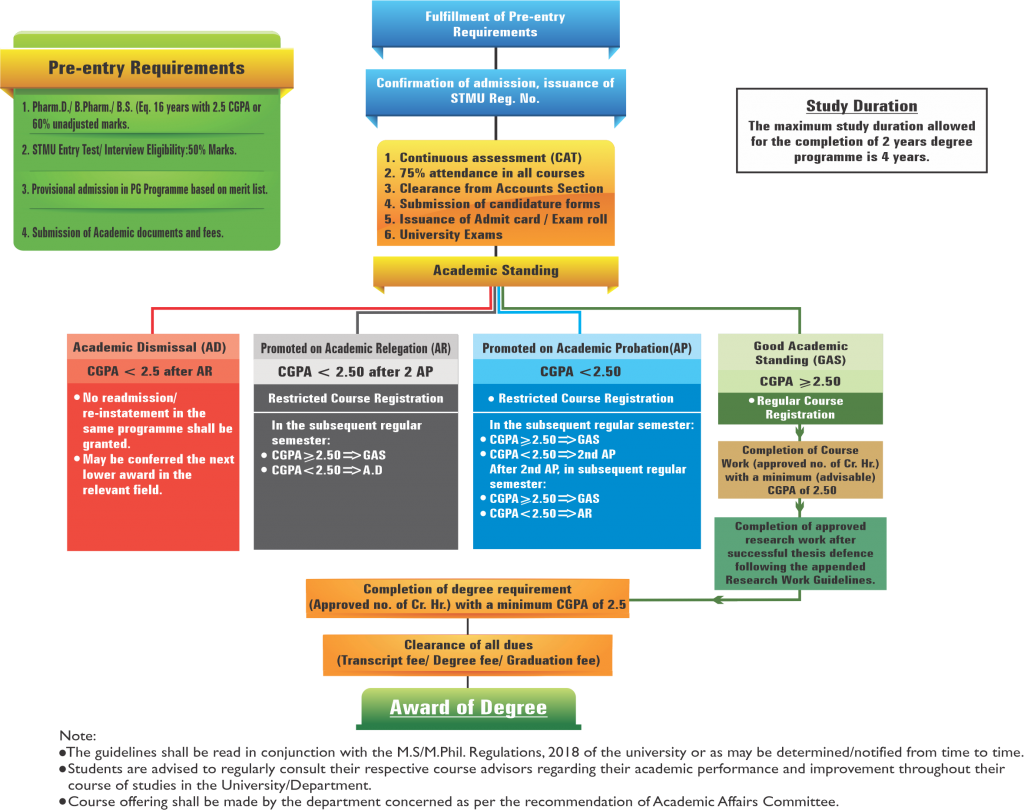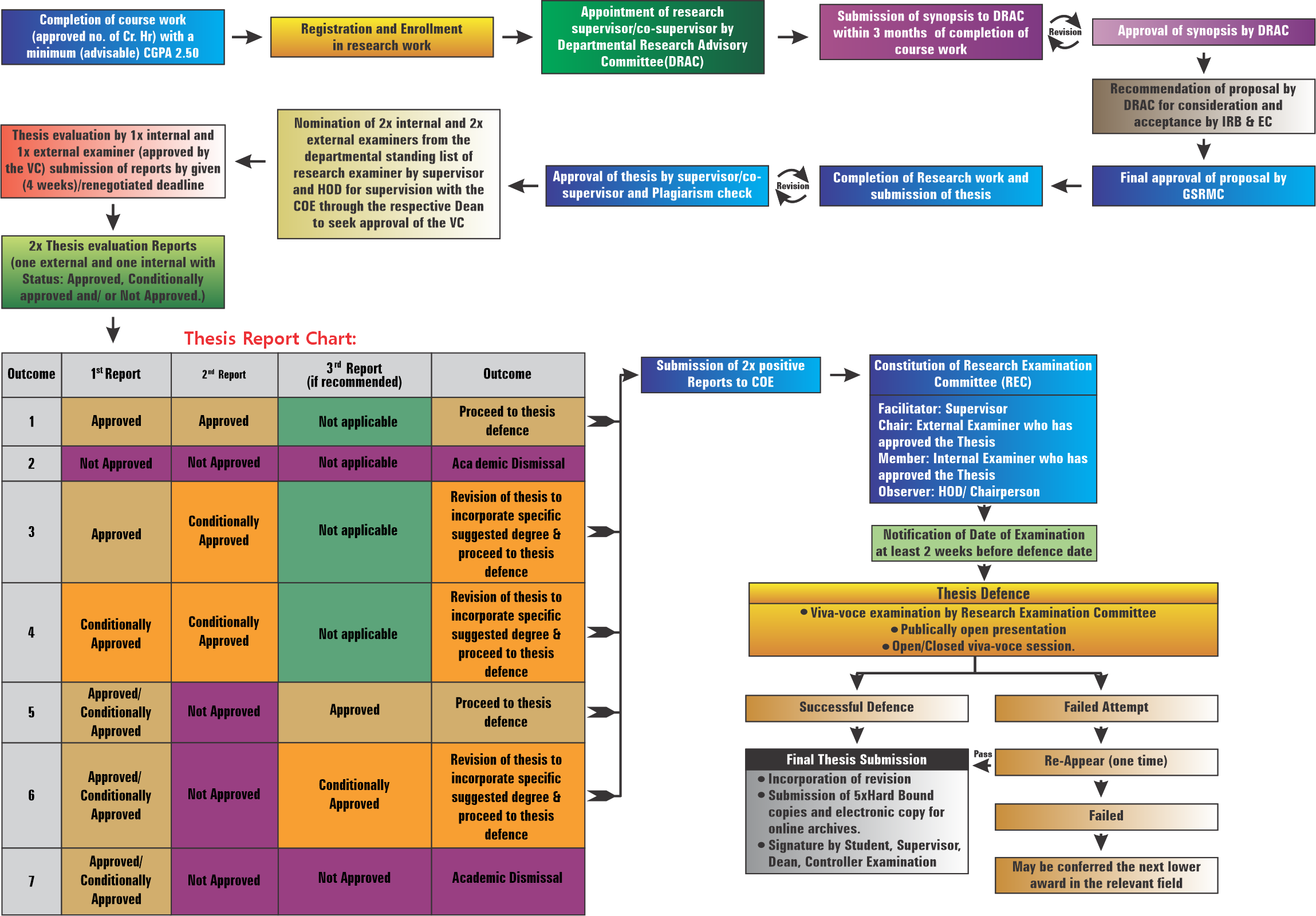M.Phil. Pharmaceutical Chemistry
September 21, 2022M.Phil. Pharmacology (Molecular)
September 21, 2022

Admissions Query
[contact-form-7 id=”567″ title=”Contact @ Admissions”]
M. Phil Clinical Pharmacy Practice
Introduction
Shifa College of Pharmaceutical Sciences (SCPS) was established under the umbrella of Shifa Tameer-e-Millat University to cater the needs of the clinical, hospital, industrial and retail pharmacy set up. The institute is in a distinctive position due to its affiliation with a world class health care system at Shifa International Hospital (SIH). It is the only model institute which is in the unique position of being a tertiary care setup along with a teaching institution for Pharmaceutical Sciences through its affiliation with Shifa Tameer-e-Millat University (STMU). This unique position (an institution with hospital & clinical pharmacy setup and a HEC & PCP recognized institution imparting education in pharmaceutical sciences) can be effectively utilized (with minimal resources and magnified outcome) to foster the development of clinical pharmacy practice within the pharmacy profession. It will set both STMU and SIH as a pioneer institute imparting education in this critical domain of clinical pharmacy practice throughout Pakistan.
The M.Phil. in Clinical Pharmacy Practice is a post graduate program which is first of its kind in the country that would offer the pharmacists a platform to develop advanced skills and knowledge which can be applied for the betterment of their profession and healthcare. This PG program is associated with a particular career path of clinical pharmacy but most skills can be applied to a range of employment situations in clinical, hospital, retail/ community and industrial set up. The program is designed for registered pharmacists who are looking to extend their clinical knowledge and skills in order to succeed in clinically-orientated careers within a variety of healthcare and academic settings. It would help in building on the existing knowledge of disease states, pharmacology and pharmacokinetics to enable application in a clinical setting. The scholars would be equipped to assess drug therapy for effectiveness, safety, compatibility and use this information to make effective interventions and develop and document pharmaceutical care plans. The program would contribute to producing academicians in the area of Clinical Pharmacy Practice for teaching of relevant undergraduate courses (Pharm. D). Moreover, the scholars would be able to develop valuable practical skills including written and oral communication, and the ability to design a project, collect, analyze and interpret data.
Career opportunities for M. Phil. Clinical Pharmacy Practice Program
The M.Phil. Clinical Pharmacy Practice program has been designed to develop the clinical pharmacy skills of pharmacists working in all sectors of the Pharmacy profession. It would help in equipping the practicing pharmacists with the skills to progress into higher level clinical roles within healthcare organizations. In particular, it is most useful for hospital pharmacists working at junior grades. It would also serve as a means for Continuing Professional Development (CPD) for pharmacists employed in primary care or academics. To re-iterate, a postgraduate program or M. Phil. is normally a pre-requisite for higher-grade posts. Similarly, community-based pharmacists are increasingly expected to obtain qualifications beyond their first degree to secure posts with a clinical element. Larger chain retail pharmacies in urban areas, both in Pakistan and abroad, have initiated the provision of clinical services including health screening, travel clinics, vaccination, anticoagulation, blood pressure assessment and medicines-use reviews. The course covers a broad range of clinical topics, preparing pharmacists for the ever-increasing clinically-orientated roles expected in current practice.
Scheme of Studies M.Phil. Clinical Pharmacy Practice
|
FIRST YEAR |
|||
|
First Semester |
|||
|
Course Code |
Module |
Course Title |
CH(s) |
|
PCTP 6004 |
Theory |
Therapeutics – I |
4 |
|
PCPA 6003 |
Theory |
Clinical Pharmacy Applications – I |
3 |
|
PCPL 6001 |
Theory |
Clinical Pharmacy Learning – I |
1 |
|
PCRT 6001 |
Theory |
Clinical Rotations – I |
1 |
|
PBST 6013 |
Theory |
Biostatistics – I |
3 |
|
Total Credit Hours |
12 |
||
|
FIRST YEAR |
|||
|
Second Semester |
|||
|
Course Code |
Module |
Course Title |
CH(s) |
|
PCTP 6014 |
Theory |
Therapeutics – II |
4 |
|
PCPA 6013 |
Theory |
Clinical Pharmacy Applications – II |
3 |
|
PCPL 6011 |
Theory |
Clinical Pharmacy Learning – II |
1 |
|
PCRT 6011 |
Theory |
Clinical Rotations – II |
1 |
|
PRMT 6003 |
Theory |
Research Methodology – I |
3 |
|
Total Credit Hours |
12 |
||
|
LIST OF ADDITIONAL, NONCREDITED COURSES |
|
|
Course Code |
Course Title |
|
PNAT 6000 |
Research Ethics |
|
PNAT 6010 |
Teaching Methodologies |
|
PNAT 6020 |
Writing and Communications in Science |
|
PNAT 6030 |
Technopreneurship |
|
SECOND YEAR |
|||
|
Third & Fourth Semesters |
|||
|
Course Code |
Module |
Course Title |
CH(s) |
|
PMRW 7006 |
Research |
Synopsis and research work |
6 |
|
PMRW 7016 |
Research |
Publication(s) and thesis |
6 |
|
Total Credit Hours |
12 |
||
|
PROGRAM SUMMARY |
|
|
PG Program |
Credit Hours |
|
First Semester |
12 |
|
Second Semester |
12 |
|
Total Course Work |
24 |
|
Third & Fourth Semester |
12 |
|
Total Research |
12 |
|
Total CH (s) |
36 |
Guidelines to Earn a Postgraduate Degree

Research Work Guideline for Postgraduate Studies at STMU

